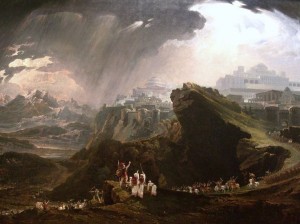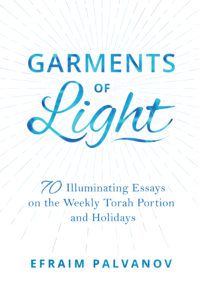In this week’s parasha, Pinchas, we read about the righteous daughters of Tzelofchad. Recall that the five daughters (Machlah, Noa, Haglah, Milkah, and Tirzah) had no male siblings, and their father had passed away, so they inquired about their inheritance. Are daughters allowed to inherit? It might sound like a straight-forward “yes”, but it was much more complicated in ancient Israel. Continue reading
Tag Archives: Rachav
Yehoshua and the Origins of Christianity
This week’s Torah portion is Pinchas, named after the grandson of Aaron, who stemmed the tide of immorality that followed the Moabite and Midianite ploy to bring Israel to sin. For his efforts, God blessed Pinchas with an everlasting blessing of peace. In the past, we explored the nature of this blessing, and how it resulted in Pinchas’ apparent immortality, as well as his eventual rebirth as Elijah the Prophet. This week, we will explore another critical figure in the Torah: Yehoshua, better known as Joshua.
Midway through this week’s parasha we read how God commanded Moses to officially appoint Yehoshua as Moses’ successor. Yehoshua is described as a person within whom rests the spirit of God. Although there are a number of Torah figures who are described as possessing some sort of Divine Spirit, Yehoshua is one of only two who are described as having the spirit within them. In most cases throughout the Bible, the spirit of God is said to rest upon an individual (‘alav in Hebrew), or to have temporarily filled an individual (mal’e or timal’e in Hebrew). With regards to Yehoshua, it says that the spirit was within him. The only other person in the Torah who is described in such a way is Yehoshua’s direct forefather Yosef (Genesis 41:38).
An even more peculiar detail about Yehoshua is that he is called “Yehoshua bin Nun”. Every other person in the Bible is referred to by their name, as well as by their father’s name, with the designation ben – “son of” – in the middle. Yehoshua alone is called bin Nun instead of the regular ben Nun. Moreover, a person named Nun cannot be found anywhere in the Torah, and unlike most other Torah figures, Yehoshua’s genealogy is not given (although one is provided in the Book of I Chronicles, written many centuries after the Torah). Other than the fact that Yehoshua stems from the tribe of Ephraim, nothing else of his origins is divulged.
Out of a Fish
There happens to be an obscure Midrash that fills in some of the details about Yehoshua’s early life. There are a few variations of the story, with one particularly tragic version that seems to
mirror the Greek myth of Oedipus. According to this Midrash, Yehoshua was left by his parents, possibly placed in the Nile River like Moses was. Miraculously, a large fish swallowed him
up, and Yehoshua was later saved by fishermen. This is the meaning of bin nun, since nun means “fish” in Aramaic. Thus, Nun is not the name of his father at all, explaining why he is not
called ben Nun. Rather, bin Nun refers to his origins from the fish, with his true genealogy unknown.
In the controversial “Oedipus” version of the story, Yehoshua is saved by the Pharaoh’s fisherman, and thus grows up in the palace, becoming the court executioner. He tragically
ends up putting his own father to death, as was originally prophesized when Yehoshua was conceived (which is why his parents abandoned him to begin with). I prefer to think of it more in the style of Moses, where Yehoshua was placed in the Nile just as Moses was, to avoid the Pharaoh’s decree of slaughtering all the male-born. By also growing up in the palace, alongside Moses (though he would have been younger), the two would have been well-acquainted, and that might explain why Yehoshua is so close to Moses throughout the Torah narrative.
Whatever the case, Yehoshua grows up to be a holy man, the personal servant of Moses, one of just two righteous spies, and the leader that finally brought the people into the Holy Land. The Sages describe him as the moon to Moses’ sun, and the key link in the chain of Jewish Oral Tradition.
The Origins of Christianity
When looking at the life story of Yehoshua, it is hard to miss the connection to Christianity. Like Yehoshua, Jesus is a Jew said to have had a miraculous birth, spent time growing up in Egypt, and was described as having the spirit of God within him. Like Yehoshua, Jesus is symbolized by a fish, and is seen as a sort-of successor to Moses (as suggested by his supposed “Transfiguration”, where he ascends to be blessed by Moses and Elijah). In the same way that Yehoshua stems from Joseph, Jesus’ “earthly father” is said to be Joseph. Jesus is described as a miracle-worker, just as Yehoshua facilitated a number of miracles, such as making the sun and moon stand still at Gibeon, and stopping the flow of the Jordan River. Of course, Jesus’ original name as pronounced in his day was Yeshu, the Aramaic version of Yehoshua.
The similarities don’t end there. Strangely, the Torah makes no mention of Yehoshua’s wife or children (even the genealogy given in I Chronicles ends with Yehoshua himself). Jesus, too, failed to marry or have kids. The Talmud (Megillah 14b) suggests that Yehoshua did later marry Rachav, the harlot that assisted the Israelites in the conquest of the Holy Land. Rachav had repented and become a righteous woman. Similarly, Jesus had close encounters with Mary Magdalene, also described as a harlot, and also controversially rumoured to have possibly married Jesus!
It is important to remember that there is absolutely no evidence for the existence of Jesus outside of the New Testament. It is well-known that the New Testament was written long after Jesus would have lived, and is full of contradictions about the details of his life. Many have challenged the historicity of Jesus, with more and more scholars suggesting that he likely did not exist at all.
Considering all that, it isn’t hard to imagine how early Christians would have put together the mythology of Jesus based on previous Torah ideas and narratives: a miraculously-born baby with the spirit of God, whose very name means “salvation”; celibate and childless, a humble, Godly servant bringing others to repentance, and leading the Israelites to the Promised Land… This is the story of the Torah’s Yehoshua, and the story that was adapted to fit the mold of a new religion a couple of millennia ago.
The Jewish Sages did always view Yehoshua as a prototype of Mashiach. After all, he is the one that defeated the embodiment of evil known as Amalek, and the one that ended the exile of the Jews, returning the people to their land. So, it isn’t surprising that Christians used Yehoshua as a prototype for their own supposed Messiah. Ironically, though, not only did Jesus fail to defeat evil, and fail to bring an end to the exile, he was also indirectly responsible for inspiring the murder of countless people thanks to all the holy wars, inquisitions, and crusades fought in his name. Jesus’ own message may have been peace, but his followers used him incessantly for war and bloodshed. Two millennia have passed, and the world is still far from perfect. We continue to await the arrival of the true Messiah. May we all merit to see his coming soon.
The article above is adapted from Garments of Light – 70 Illuminating Essays on the Weekly Torah Portion and Holidays. Click here to get the book!


